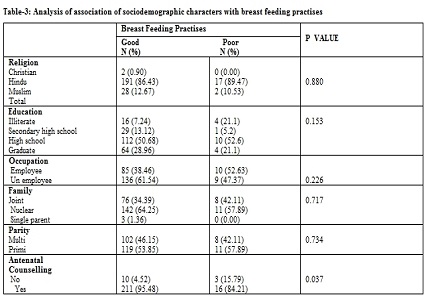Knowledge, attitude and practise of breast feeding among postnatal mothers at rural tertiary hospital
Abstract
Objectives: To assess the knowledge, attitude and practice of breast feeding among admitted postnatal mothers and to find out their relationship with socio demographic factors.
Material and Methods: This was a prospective cross sectional study of 240 post-natal mothers admitted in rural tertiary care hospital. The study included a face to face interview of mothers using a pretested questionnaire and analysis of data using SPSS (version 20).
Results: Majority (n=201, %=87.5) of mothers belong to age group of 18 to 26 with mean of 23.4 and standard deviation of 3.14. Maximum (87.5%) mothers belonged to Hindu religion. More than half of them were housewives (61%) living in nuclear families and up to 40% of study population were employed. Majority of mothers from study group were primi - para (54.1%). Prelacteal feeds were given by 16% and colostrum was discarded by 8% of mothers. About 80% of mothers were knowledgeable and likely to exclusive breast fed their babies. Antenatal counselling was received by 93.3% of mothers and majority of them by doctor 45.91%. Significant association is seen with antenatal counselling (pvalue<0.03) and good breast feeding practises in post-natal mothers.
Conclusion: Antenatal counselling promotes good breast feeding practises hence existing antenatal counselling on breastfeeding needs to be strengthened by informing all pregnant women about the benefits of breastfeeding and motivating them by curtailing their ill beliefs regarding breastfeeding and educating them that breast Feeding is the healthiest and safest way to feed babies.
Downloads
References
2. United Nations Children’s Fund (UNICEF): Tracking progress on child and maternal nutrition: a survival and development priority. Nov 2009, http://www.unicef.org.
3. Heckman JJ: Factors influencing milk production in nursing mothers. 2011, http://child encyclopedia.com
4. Singh K, Srivastava P: The effect of colostrums on infant mortality: urban rural differentials. Health and population. Perspect Issues. 1992 May, 15 (3&4): 94-100.
5. Okolo SN, Ogbonna C: Knowledge, attitude and practice of health workers in Keffi local government hospitals regarding baby-friendly hospital initiative (BFHI) practices. Eur J ClinNutr. 2002 May;56 (5): 438-441. 10.1038/sj.ejcn.1601331.
6. Fergusson DM, Beautrais AL, Silva PA: Breast-feeding and cognitive development in the first seven years of life. SocSci Med. 1982, 16: 1705-1708. 10.1016/0277-9536(82)90096. [PubMed]
7. Furman L, Minch NM, Hack M: Breastfeeding of very low birth weight. J-Hum-Lact. 1998 March 14 (1): 29-34. 10.1177/089033449801400112]. [PubMed]
8. World Health Organization (WHO) The global strategy for infant and young child feeding. Geneva: WHO; 2003www.who.int/nutrition/topics/global_strategy/en
9. International Institute for Population Sciences. National family health survey (NFHS 3), 2005–06: https://dhsprogram.com/pubs/pdf/FRIND3/FRIND3-VOL2.
10. UNICEF and world health organization 2003.Global strategy for infant and young child feeding,GenevaSwitzerland. www.who.int/nutrition/publications/infantfeeding/9241562218/en/
11. A. EkanemIA,Ekanem AP, Asuquo A ,Eyo VO Attitude of Working Mothers to Exclusive Breastfeeding in Calabar Municipality, Cross River State, Nigeria. Journal of Food Research. 2012 May; 1(2):71-75. doi:10.5539/jfr.v1n2p71.
12. Chaudhary RN, Shah T, Raja S. Knowledge and practice of mothers regarding breast feeding: a hospital based study.Health Renaissance .2011 Dec; 9 (3); 194-200.
13. Jain1, Jyoti,Bala .Knowledge of breastfeeding and breast feeding practises among mothers delivered at teritiary level obstetric care hospital at Udaipur. J Med Pharm Sci. 2013 Sep ;4 (1):15.
14. Medhi GK, Mahauta J. Breastfeeding weaning practices and nutritional status of infants of tea gardens of Assam. Indian Pediatr. 2004 June;41:1277-78. [PubMed]
15. Ben Slama F, Ayari I, Buzini F, Belhadj O, Achour N. Exclusive breastfeeding and mixed feeding- knowledge, attitudes and practices of primi parous mothers. East Mediterr Health J. 2010 June;16(6):630-35.
16. Bahl L, Kaushal RK. Infant rearing practices in and Beliefs in rural Inhabitants of Himachal Pradesh. Indian Pediatrics 1987 April;24:903-906. [PubMed]
17. Vimla V, Ratnaprabha C .Infant feeding practices among Tribal Communities of Andhra Pradesh Indian Pediatrics 1987 Oct; 24: 907. [PubMed]
18. Agarwal N, Swami H.Socio-demographic correlates of breast-feeding in urban slums of Chandigarh.Indian J Med Sci. 2006 Nov; 60(11):461-6. [PubMed]
19. Udgiri R, Shashank KJ, Sorganvi V. Breast Feeding Practices Among Postnatal Mothers- A Hospital Based Study. J AdvSci Res. 2015 May;6(1):10-3.
20. Manas,Pratim Roy.Determinants of Pre lacteal Feeding in Rural Northern India . J Prev Med. 2014 May; 5(5): 658–663. [PubMed]
21. Kloeblen-Tarver AS, Thompson NJ, Miner KR. Intent to breast-feed- the impact of attitudes, norms, parity and experience. Am J Health Behav.2002 June;26:182–187. [PubMed]
22. Hurley KM, Black MM, Papas MA, et al: Variation in breastfeeding behaviours, perceptions, and experiences by race/ethnicity among a low-income state wide sample of special supplemental nutrition program for women, infants and children (WIC) participants in the United States.Matern Child Nutr. 2008 April,;4:95–105.
23. Persad MD, Mensinger JL.Maternal breastfeeding attitudes - association with breast feeding intent and socio-demographics among urban primiparas.J Community Health. 2008 April; 33:53–60.
24. Wojcicki JM, Gugig R, Tran C, Kathiravan S, Holbrook K, Heyman MB: Earlyexclusive breastfeeding and maternal attitudes towards infant feeding in a population of new mothers in San Francisco, California. Breastfeed Med.2010 Feb; 5(1):9–15.
25. Girish S, Ghandhimathi M. Mother’s Knowledge, Attitude and Practice of Breastfeeding. International Journal of Advanced Nursing Science and Practice. 2015 June;2(1):41-8.
26. Shwetal1 B, Pooja P, Neha K, Amit D, Rahul P. Knowledge, Attitude and Practice of Postnatal Mothers for Early Initiation of Breast Feeding in the Obstetric Wards of A Tertiary Care Hospital of Vadodara City. National Journal of Community Medicine. 2012 April;3(2):305-9.

Copyright (c) 2017 Author (s). Published by Siddharth Health Research and Social Welfare Society

This work is licensed under a Creative Commons Attribution 4.0 International License.


 OAI - Open Archives Initiative
OAI - Open Archives Initiative


